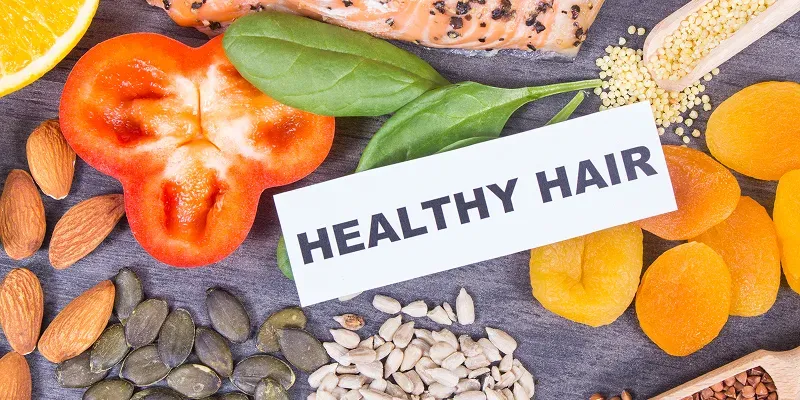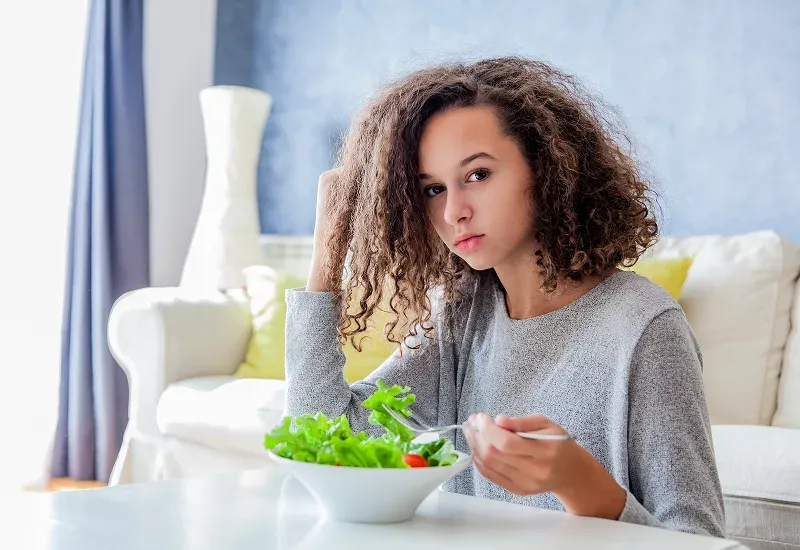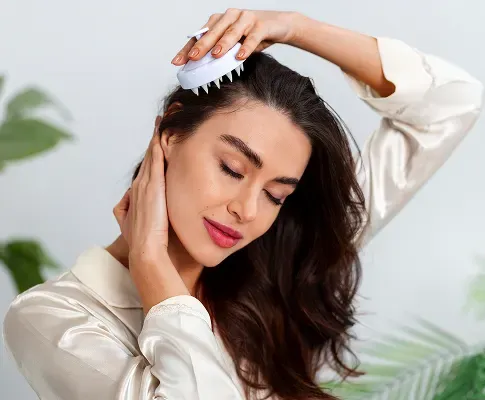
Managing Hair Loss: How Diet, Lifestyle, and Stress Impact Your Hair Health

Dr. W. Rizvi
21 Jul 2025
Seeing more hair fall out than usual can be alarming. It’s something that catches many people off guard, and it often leads to a search for answers. While some hair loss causes are out of our hands, like genetics or age, many are connected to our everyday routines. What we eat, how we live, and how we handle pressure can quietly affect the health of our hair more than we realize. There is a strong link between diet and hair health. Your hair needs specific nutrients to grow well and stay strong. When your body doesn’t lack particular vitamins, minerals, or protein, your hair may begin to thin or shed more than usual. Skipping meals, extreme diets, or lacking variety in your food can weaken your hair over time. Eating balanced meals with enough iron, zinc, and vitamins like B12 and D can help support healthy hair from the inside out.

The way you live your daily life also plays a significant role. Not getting enough sleep, skipping exercise, smoking, or being around pollution daily can slowly wear down your hair’s health. These things affect your body’s ability to repair itself, resulting in weaker, more damaged strands. The lifestyle impact on hair is real, even if it doesn’t look obvious initially. One of the most influential elements in this equation is distress, which can quietly magnify existing issues and interfere with the hair’s natural growth cycle. Adopting steady, positive changes in daily habits can offer lasting benefits for hair health. Another critical factor to consider is stress. Many people are surprised to learn how strongly stress and hair thinning are connected. When dealing with physical or emotional strain, your body may respond by pausing activity in the hair follicles, leading to increased shedding over time.
The good news is that you can take real steps toward improving hair growth by paying attention to these areas. It’s not always about quick fixes or expensive treatments. Sometimes, simple diet, lifestyle, and mindset shifts can make a lasting difference. In the sections ahead, we’ll explore practical ways to support healthier hair, starting with the choices you make every day.
The Connection Between Diet and Hair Health
The link is much bigger than most people think when understanding diet and hair health. Hair is made up of cells that require steady nourishment to stay healthy, and if your diet is lacking in specific key nutrients, your hair may suffer. On the other hand, feeding your body the right vitamins, minerals, and proteins can help reduce breakage, support hair follicle strength, and lead to fuller, shinier hair.
Poor nutrition is often one of the overlooked causes of hair loss, especially in people who skip meals, follow extreme diets, or eat a heavily processed food routine. Without the right building blocks, your body may slow down nonessential functions like hair production to conserve energy. By recognizing this connection early, you can begin making changes that directly and visibly impact your hair’s health.
- Suppose your body doesn’t get enough protein from your diet. In that case, it may prioritize more vital systems like organ repair over hair growth. This can cause hair’s shedding. To prevent this, include high-protein foods like chicken, nuts, fish, eggs, etc.
- Without enough iron, follicles don’t work, which can slow or halt new hair production. Low iron levels are common causes of nutritional hair loss, especially in women. Leafy greens, red meat, beans, and fortified cereals are all excellent sources to improve iron levels throughout your diet.
- Vitamin D supports the development of new hair follicles and helps maintain strong roots, with deficiencies often linked to thinning and scalp issues. Natural sources include sunlight, fatty fish like salmon, fortified dairy products, and egg yolks.
- Zinc plays a key role in scalp repair, oil production, and the maintenance of hair follicle health. Without enough zinc, hair may start to shed or break more easily. Foods such as pumpkin seeds, chickpeas, beef, and shellfish are excellent sources of zinc.
- Biotin is a B vitamin that assists in the creation of keratin. Not getting enough biotin can lead to brittleness or dullness. Biotin-rich foods include eggs, almonds, spinach, and sweet potatoes.
- Healthy fats like omega-3s nourish your scalp and support cell function in the skin and follicles. A steady intake of these fats can help reduce inflammation, which sometimes contributes to stress and hair thinning. Salmon, walnuts, chia seeds, and flaxseeds are ideal sources.
- Some foods can quietly harm hair health by causing inflammation and disrupting the natural hair growth cycle. For instance, high-sugar, processed, greasy foods, excessive caffeine, and alcohol can block the absorption of key nutrients vital for improving hair growth.
Understanding how diet and hair health are linked allows you to take control before problems worsen.
Lifestyle Habits That Support Hair Health
There is a direct lifestyle impact on hair, where small actions like how you care for your hair, stay active, and manage stress can either strengthen or harm your hair over time. Exercise increases circulation to the scalp, helping deliver essential nutrients for hair growth. At the same time, restful sleep supports the natural cycle of hair renewal. Elevated stress levels can cause hair follicles to enter a resting stage prematurely, contributing to hair thinning. Relaxation methods to reduce stress can benefit your hair health and overall wellness.
Hair Care Tips to Prevent Damage
The way you care for your hair physically has a significant impact on its strength and health. Healthy habits around washing, styling, and brushing are essential for improving hair growth and avoiding damage. Washing too often strips natural oils, while washing too little can clog follicles, so find a balance that suits your hair type. Limiting heat styling protects hair from breakage, and using heat protectants, when necessary, helps reduce damage. Chemical treatments can weaken hair, so choose gentler options and space out applications. Using the right tools for brushing and avoiding forceful combing helps prevent breakage, especially on wet hair. Tight hairstyles create tension that can lead to hair loss, so looser styles give your scalp a chance to recover. Combining gentle care with good nutrition and stress management addresses key causes of hair loss. It supports healthier, stronger hair over time.
Sleep and Hair Health
Quality sleep is crucial for your body’s ability to repair itself, including your hair follicles. When you don’t get enough rest, it can throw off your hormones and increase stress levels, which may lead to hair thinning. Aiming for up to 8 hours of uninterrupted sleep each night and relaxing habits like reading or meditation before bed can help support healthy hair growth.

Need Any Help?
Contact UsExercise for Healthier Hair
Staying active boosts blood flow to your scalp, delivering the oxygen and nutrients your hair follicles need to grow strong. Just 30 minutes of movement most days, whether jogging, yoga or even walking, can improve circulation and contribute to healthier hair.
The Role of Stress in Hair Loss
Long-term stress can weaken the immune system and limit nutrient delivery to the scalp, making it more difficult for hair to grow back. Conditions such as telogen effluvium, alopecia areata, and trichotillomania are often associated with high-stress levels.
Managing stress is one of the best ways to protect your hair. Techniques such as deep breathing, meditation, regular exercise, and building a supportive social circle can help lower stress and promote hair growth. Additionally, getting sufficient quality sleep is crucial for managing stress and preventing hair loss.
Conclusion
Hair loss can stem from various factors, including diet, lifestyle, and emotional strain. The good news is that many of these factors can be managed with intentional changes. Understanding how your habits affect your hair empowers you to take steps toward healthier, stronger strands. Small, consistent efforts over time make a big difference, so start today and give your hair the care it needs.
Contact your Endocrinologist today, Dr. W. Rizvi at R-endocrinology, to learn more about Managing Hair Lossa and How Diet, Lifestyle, and Stress Impact Your Hair Health?
Resource:
How Electrolyte Imbalance Affects Your Health: Signs and Symptoms to Watch For
Share This:
Disclaimer
*Please note that the information provided in the blogs and articles is intended for general informational purposes only and should not be considered medical advice. We strive to bring you the latest information about the endocrine world; however, we encourage you to seek individual medical advice and treatment options during your consultation with a qualified healthcare professional. *
